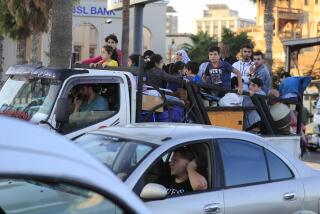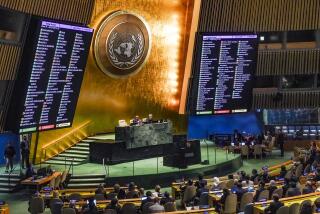Baghdad Clings to Normalcy as Troops Flock to Front : Iraq: The assembly gives Hussein power to do ‘whatever is needed’ to defend the country.
- Share via
BAGHDAD, Iraq — Provided with a new flag and official ratification of a willingness to go to war, Iraqi troops flocked south by car and bus to the front Monday, leaving behind a capital city that largely maintained the rhythm of workaday life.
Today is the deadline set by the United Nations for Iraqi leader Saddam Hussein to quit Kuwait or face military attack from a U.S.-led force gathered in Saudi Arabia and the Persian Gulf. Hussein gave no indication of bowing to the U.N. will, and Iraqi officials repeated that, for them, Jan. 15 is a date without meaning.
Hussein, in pre-dawn comments to Iraqi journalists, called for President Bush to take steps to avert combat. “If they (the United States) want war, no other power can stop it,” he said. “A last-minute initiative is up to the Americans because they are the ones raising the slogan of war.”
In the morning, the country’s powerless National Assembly voted to give Hussein authority to do “whatever is needed” to defend Iraq.
“This is an historic confrontation. Steadfast Iraq, led by President Saddam Hussein, has resolved to fight,” the assembly resolution stated. “Iraqis will fight valiantly to be martyred or to achieve victory. . . . This aggression will be repelled by the experience of the Iraqi army.”
The assembly meeting was enlivened by religious fervor, with Koranic verses shouted throughout the domed hall.
Hussein has worked to convert his battle for Kuwait into a holy cause and on Monday ordered that the words “God Is Great,” the Muslim call to prayer, be emblazoned on the green-starred, red, white and black national flag.
Hussein met with his top army commanders, official reports said. He also warned that Iraq’s missiles are “capable of hitting their targets.”
Over the 5 1/2 months of the crisis, Hussein has threatened that, if attacked, he will target Israel with missiles and will strike oil installations in Saudi Arabia as well. On state television, air force commanders wrote Hussein to assure him that all units are ready to “respond to any aggression, no matter where.”
The newspaper Qadisiya, published by the Defense Ministry, issued a warning that signaled possible guerrilla and terrorist attacks on the property and citizens of the United states and its many allies.
“The battle will extend to the entire map of the Earth and wherever there are American and foreign interests hostile to Iraq,” it said.
In Baghdad, civilian residents appeared to go about their regular business. Markets were busy, but there seemed to be no special rush to buy food; children attended school; the limited air traffic from Saddam Airport--domestic flights and flights to Jordan only--left as scheduled.
However, some banks limited withdrawals because of a crush of customers trying to extract their savings.
There has been a persistent exodus of thousands of residents from this city of 4.5 million people, but the vast majority seemed to be staying on.
The biggest visible change in Baghdad in recent days has been the increasing numbers of soldiers visible on the streets and highways. It is rare to see a teen-ager or young man in anything but fatigues and military beret.
At the central bus station and at Nahdha Park at one of the exits to the city, thousands of soldiers boarded buses and taxis for the ride south to Basra, the main city on the Persian Gulf, and Kuwait, where half a million Iraqi troops are dug in to face the allied force.
One soldier said that he was bound for Ramadi, a town near Baghdad, and happy for it because of its distance from the main battlefront. “I hope I stay,” he remarked cheerfully.
In a tone that was at once conciliatory and uncompromising, Hussein addressed an open letter to King Fahd, who as leader of Saudi Arabia is hosting allied forces in his kingdom.
“Isn’t it time you think of the problem you pushed yourself into?” asked Hussein, who assured Fahd that Iraq would never attack Saudi Arabia.
Hussein offered to open talks among Arab states to resolve the crisis, but gave no hint of giving up Kuwait.
If the Saudis stand firm with the United States and other nations arrayed against Iraq, Hussein wrote, “We will consider your position a declaration of war.”
Two special Arab envoys were in Baghdad for talks with Hussein: Abdul Salam Jalloud, a member of Libya’s ruling Revolution Command Council, and Ahmed Ben Bella, a former Algerian leader.
There was no word on the subject of their talks; the governments of both countries have tried to persuade Iraq to leave Kuwait in return for security guarantees and the promotion of a resolution to the Israeli-Palestinian conflict.
Iraq has tried to tie talks on the Kuwait crisis to consideration of Israel’s occupation of the West Bank and Gaza Strip.
More to Read
Sign up for Essential California
The most important California stories and recommendations in your inbox every morning.
You may occasionally receive promotional content from the Los Angeles Times.













